

Business Ethics. About Freakonomics: The Movie. Freakonomics: The Movie (available on Netflix and Hulu) is Chad Troutwine’s documentary film adaptation of the phenomenally bestselling book about incentives-based thinking by Steven Levitt and Stephen Dubner.
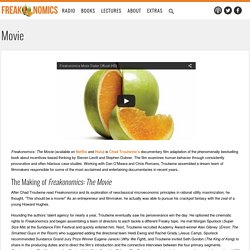
The film examines human behavior through consistently provocative and often hilarious case studies. Working with Dan O’Meara and Chris Romano, Troutwine assembled a dream team of filmmakers responsible for some of the most acclaimed and entertaining documentaries in recent years. The Making of Freakonomics: The Movie After Chad Troutwine read Freakonomics and its exploration of neoclassical microeconomic principles in rational utility maximization, he thought, “This should be a movie!” As an entrepreneur and filmmaker, he actually was able to pursue his crackpot fantasy with the zeal of a young Howard Hughes. Hounding the authors’ talent agency for nearly a year, Troutwine eventually saw his perseverance win the day. Reviews “. . .well worth dipping into.”– TIME MAGAZINE. Corporate-profits-grow-ever-larger-as-slice-of-economy-as-wages-slide. The Commerce Department also said total wages and salaries last year amounted to $7.1 trillion, or 42.5 percent of the entire economy.
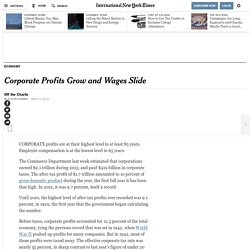
That was down from 42.6 percent in 2012 and was lower than in any year previously measured. Including the cost of employer-paid benefits, like health insurance and pensions, as well as the employer’s share of and contributions, the total cost of compensation was $8.9 trillion, or 52.7 percent of G.D.P., down from 53 percent in 2012 and the lowest level since 1948. Benefits were a steadily rising cost for employers for many decades, but that trend seems to have ended. In 2013, the figure was 10.2 percent, the lowest since 2000. One way to look at the current situation is to compare 2013 with 2006, the last full year before the recession began. The accompanying charts compare President Obama’s administration with each of his predecessors, going back to Herbert Hoover.
The stock market has reflected that strong performance. Continue reading the main story. Yes, the American Economy Is in a Funk — But Not for the Reasons You Think - Freakonomics Freakonomics. The U.S. is not likely to ever again see economic growth like that of the 20th century, says economist Robert Gordon.
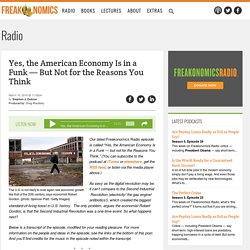
(photo: Spencer Platt / Getty Images) Our latest Freakonomics Radio episode is called “Yes, the American Economy Is in a Funk — but not for the Reasons You Think.” Explicit cookie consent. Our Kids: The American Dream in Crisis.
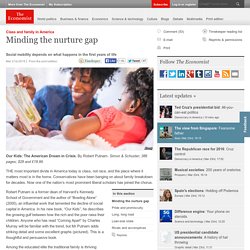
By Robert Putnam. Simon & Schuster; 386 pages; $28 and £18.99. THE most important divide in America today is class, not race, and the place where it matters most is in the home. Conservatives have been banging on about family breakdown for decades. The Economist sur Twitter : "There is a growing gulf between how the rich and the poor can raise their children. It shows.
Labor Demand. From Globalization to Glocalization. Watching IBM. La digitalización destruirá empleo. Hay un nuevo orden con serias consecuencias para el empleo.
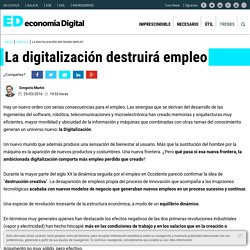
Las sinergias que se derivan del desarrollo de las ingenierías del software, robótica, telecomunicaciones y microelectrónica han creado memorias y arquitecturas muy eficientes, mayor movilidad y ubicuidad de la información y máquinas que combinadas con otras ramas del conocimiento generan un universo nuevo: la Digitalización. Un nuevo mundo que además produce una sensación de bienestar al usuario. Más que la sustitución del hombre por la máquina es la aparición de nuevos productos y costumbres. Una nueva frontera. ¿Pero qué pasa si esa nueva frontera, la ambicionada digitalización comporta más empleo perdido que creado? Durante la mayor parte del siglo XX la dinámica seguida por el empleo en Occidente pareció confirmar la idea de "destrucción creativa". Una especie de revolución incesante de la estructura económica, a modo de un equilibrio dinámico. ¡Ah, pero esta vez es distinto!
Hay dos reflexiones concretas sobre todo esto: The Spy Who Fired Me (Harper's Magazine 2015/Feb/xx)
Let Anyone Take A Job Anywhere. For The Motion Bryan Caplan Professor of Economics, George Mason University Bryan Caplan is Professor of Economics at George Mason University and Senior Scholar at the Mercatus Center.
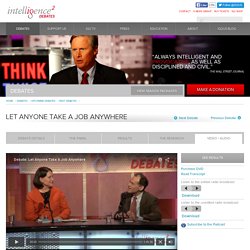
He is the author of The Myth of the Rational Voter: Why Democracies Choose Bad Policies (2008), named "the best political book of the year" by the New York Times, and Selfish Reasons to Have More Kids: Why Being a Great Parent Is Less Work and More Fun Than You Think (2012). He has published in The New York Times, Washington Post, The Wall Street Journal, American Economic Review, Economic Journal, Journal of Law and Economics, and Intelligence, and appeared on 20/20, FoxNews, and C-SPAN. Learn More Vivek Wadhwa Vice President of Innovations and Research, Singularity University. Future of business conference: Next:Economy, November 12 - 13, 2015, San Francisco, CA. What’s the future of business?
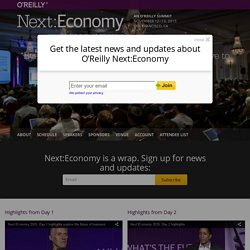
WTF? In San Francisco, Uber has 3x the revenue of the entire traditional taxi and limousine industry. WTF? Without owning a single room, Airbnb has more rooms on offer than some of the largest hotel groups in the world. The Future of Jobs. Publications.